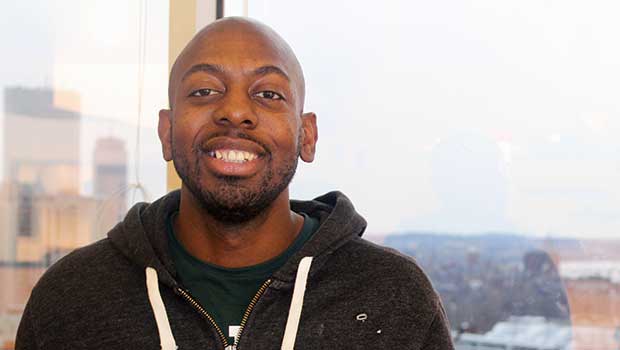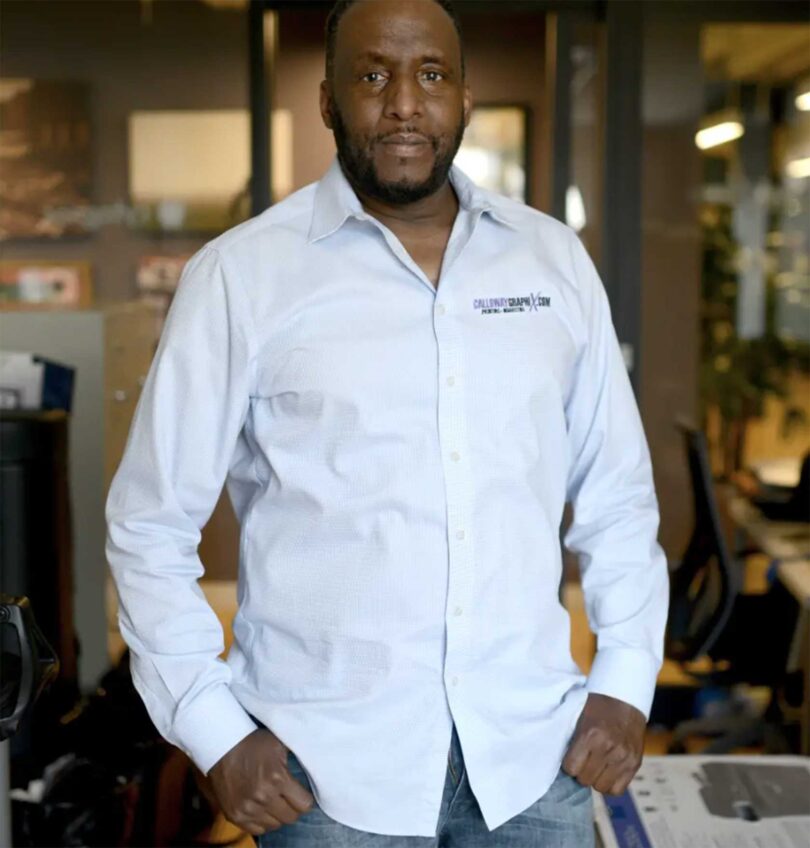Moving business forward
Entrepreneur developing app to assist with personal savings

Entrepreneur Savant Musa, founder of FRWD, says financial literacy is one of the most common issues hurting Americans. He cites the statistic from the Federal Reserve that over 46 percent of Americans have less than $400 in their savings account, and he says 50 percent of people that make over $10,000 in America have less than $10,000 in savings.
By the numbers
60 percent of Americans don’t have $400 in their savings account.
50 percent of Americans that make more than $10,000 annually have less than $1,000 in savings.
50 percent of Baby Boomers have no retirement fund
On the web
For more information about FRWD, visit: www.facebook.com/frwdinc/
FRWD (pronounced “forward”), a publicly-registered startup company as of 2015, offers an application to automate the savings process.
“As humans, we’re people of habit. Right now, we don’t have habits that help us save,” he says. “I think savings would work better when they’re automated. Too many people already live paycheck to paycheck. And this goes beyond race or socioeconomic status. It’s a problem across the board. You read about people with $150,000 that don’t keep savings.”
The design of his application is basic. It takes 14 percent of a user’s gross income — equivalent to roughly one hour of work each day — and puts it in a savings account. When it reaches a certain amount, the team at FRWD reports the savings to credit bureaus.
The app intends to advance users’ economic mobility, as its name suggests.
A network of resources
Musa decided to actualize his vision of FRWD after watching his friends Brian and Justin Gerrard, co-founders of BAE, achieve success.
The Gerrard brothers created BAE, a dating application for the black community, that was acquired by Tagged in 2016. Having worked as a brand ambassador for BAE until his graduation in 2016, Musa felt encouraged by the Gerrard brothers’ success to startup his own company.
Seeing Boston as the “Silicon Valley of the East,” he moved to the city and planned his entrepreneurial route. He saved, driving for Uber and doing odd jobs for a year.
He was accepted into Resilient Coders, a nonprofit training program that teaches a small number of applicants to code and provides free office space in the Cambridge Innovation Center. At RC, he learned how to code his own vision, a move that has been a boon for FRWD, he says, noting that it would have cost him $25,000 to hire someone to code the application.
Classmates from Howard are helping Musa advance the project. Makamba Sackey, an engineer for Chevron, develops FRWD’s social media presence and supports Musa as his chief operations officer. Nia Johnson designs the app.
Other resources have come from Startup Worcester, a competitive incubator that accepted FRWD to its program in June. Its application required Musa to work with a mentor to create a business plan, which the incubator now helps Musa improve. It also allows Musa to practice pitching skills and develop his relationship with the bank that plans to hold FRWD’s savings accounts.
Musa also relies on a network of online users to test his application. FRWD has almost 3,600 followers on Facebook, and 500 of these people do alpha testing, which helps Musa work to refine the application.
FRWD will launch on the Apple Store, Google Play and a website in April 2018. For now, Musa devotes all of his time to coding and developing, working to perfect the app.
“I feel like this is my one chance,” he says. “I’ve always been taught that you do things in excellence.”
A background in resilience
Musa says he discovered willpower when he was 9 years old and a teacher told him he would amount to nothing. He graduated high school at age 16 from a gifted students program.
After entering Howard University, his dream school, Musa experienced a tragedy. His father passed away during his sophomore year of college. He left school, saying he needed to get away. He joined the Army and served for seven years. He returned to Howard in 2014.
“Even though it took me 14 years to get a bachelor’s degree, I had set the goal to get one. I wanted my mother to see me graduate,” he says.
Musa notes that his mother instilled a high regard for education in him. She served as the first African American guidance counselor at his public high school in Houston, Texas.
“I wanted my mother to see me graduate, and she did. She saw me graduate with Barack Obama as my commencement speaker. Imagine her life — she’s 72 years old — going from seeing segregation to seeing that.”
His life since moving to Boston has continued to test his resilience. He lost his home to a fire last year — a domestic disturbance in a neighboring apartment started a fire, which spread fast. Authorities arrived on the scene after his apartment began to burn. “It was Superbowl Sunday,” he says, nearly smiling.
Given what he’s been through, the importance of disaster savings is especially clear to Musa. With FWRD, he can help others accumulate disaster and emergency funds through careful savings.
Musa says his personal philosophy and gratitude for past opportunities motivates him every day.
“In life, you have to find the person that will tell you yes,” he says. “There’s going to be a lot of nos. You just have to get past those nos. One incubator told me ‘no.’ I just saw the guy today. Did I act like he said no? I shook his hand and treated him like a friend —because another incubator told me yes.”
Looking forward
Musa hopes to eventually return to his original passion for politics and financial literacy. He would like to lobby for including financial literacy in school curriculums.
“The problem I wanted to combat was people not knowing how to save,” he says. “Making an application seemed like the smartest path. If it’s successful, I’ll have more resources to lobby for financial literacy being taught in schools.”
For now, Musa channels his ambition into FRWD, focusing on creating a high-quality product.
“I think if you put good work out there, the universe makes things happen. I’ll meet politicians if people are using my app. When it’s time for us to meet, we’ll meet.”






